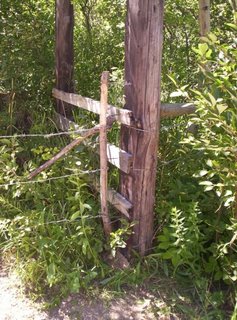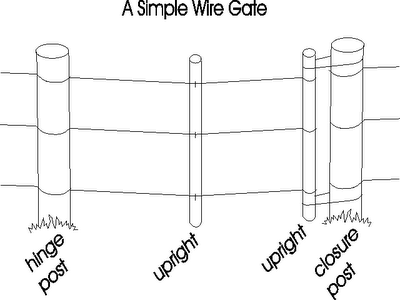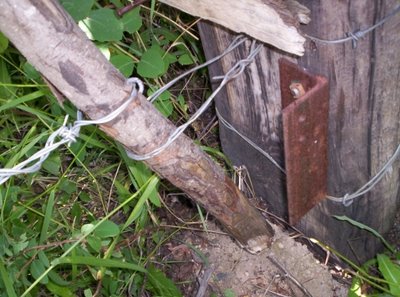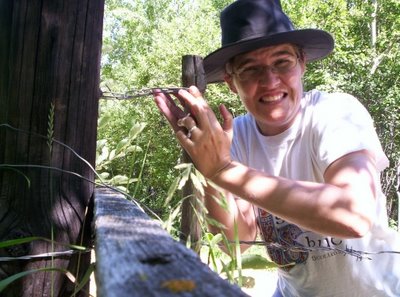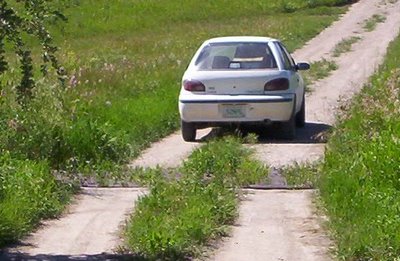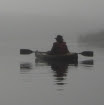They've extended the ice-core record
back to 800,000 years, and still no challenge to our modern triumph: the highest atmospheric CO
2 levels in the entire record! And beyond! Way beyond! Hooray for civilization!
I did a Blogger blogs search for reaction to this news, and found Tim Denton's
cheery response, as well as
an even cheerier post of his from a couple of days ago, in which he has the arrogance to suggest that (gasp) humans may be contributing to global warming! But wait - his arrogance goes even further: he is so certain about the future of Earth's climate, he can assure us that this anthropogenic global warming is a good thing. The larger trend is global cooling, you see, so this warming event is a pretty fine human accomplishment.
I'm so relieved. But, Mr. Denton, I have such a long habit of worrying, please excuse me, but I still have a couple of questions.
How do you know we're increasing the CO
2 at the correct rate? I mean, sure, it's colder now than it has been at various times in the past 15,000 years, but how do you know just exactly how much higher the CO
2 should be now than it was then, to correct for the mystery factor that's been making it colder? Wait a minute, I'm confused. I thought you said that the global warming hypothesis doesn't fit the facts, and you mentioned those warmer times . . . Were you saying that there is no link, after all? But then, how can you say that our global warming is good?
Oh dear. I wanted to believe your good news. Give me a minute to spell out the implicit points of your argument here, and see if I can understand it.
During time period A (shortly after the last ice age), temperatures were higher than they are today.
During time period A, CO
2 levels had not been significantly elevated by humans.
Therefore, CO
2 levels being elevated by humans did not cause the high temperatures of time period A.
Therefore we should not expect CO
2 levels to have any significant effect on temperatures.
Umm, Mr. Denton. Isn't that argument analogous to this one:
Car A was in an accident.
Car A was not travelling over the speed limit.
Therefore travelling over the speed limit did not cause Car A's accident.
Therefore we should not expect speed to have any significant effect on car accidents.
I'm sure you'll agree with me that this argument is false. So, now I can happily accept your larger argument, that CO
2 is leaching out of the atmosphere causing global cooling, and humans came up with their Industrial Revolution just in time to turn this around. Maybe, to clear up your minor confusion about the global warming hypothesis, you'll be glad to hear my alternative interpretation of those earlier warm times. You see, things moved slower then. CO
2 levels increased and decreased over centuries and millenia, instead of just decades. So you see (I hope you're following this), it could be that the current temperature just hasn't caught up to the current CO
2 level. If I may be so bold, I'd say we have only barely begun to see the scope of our accomplishment here. We're going to set that global cooling trend back a lot more yet! Good news, I know.
But I'm such a worrywort, Tim, my friend. What if - what if it's true what I hear, that the sun is kind of slowing down and giving us less light and warmth, and - what's that you say? Oh, yes, I know, that makes global warming a good thing, but, but - what if we're doing it all too fast, kind of like burning up your whole firewood supply in the first few days of winter? What if we run out of carbon-based fossil fuels before this solar dimming spell turns around, and then - oh dear, I hate to think of it - and then we don't have all that petroleum to fuel our economy to keep the research going to find another solution - oh please, Mr. Denton, tell me you've got this all figured out.
Oh, I'm freaking out here. Let me take a break, go for a walk, breathe deeply . . .
Ah, that's better. Now, you'll be happy to hear that I can be an optimist too. I just realized that I've been worrying too much about this whole thing. I really was wrong to think that human activity could disrupt natural cycles so badly. Sure, CO
2 levels are way outside their natural range for the past 800,000 years. The way I see it, we've moved them so fast that the temperature has barely begun to catch up. But here's the good news. The temperature may never catch up! We're about to run out of cheap oil (if we haven't already), but we're still very determined to burn it as fast as we can, so it's probably only a few more decades - or years, even - before oil is suddenly ridiculously expensive, and our CO
2 emissions will drop like a stone. We won't run out of oil, but as soon as we run out of cheap oil, our economy will collapse and we'll leave lots of oil in the ground. Fertilizer will become ridiculously expensive; food production will plummet; people will die and be buried and thus create billions of little carbon sinks; forests will spring up on the abandoned farmland; and lo, the crisis will be over. We could have been cautious and tried to conserve our fossil fuels and spread this CO
2 peak over a few centuries, but no, we made it a harmless little blip.
The Earth will go back to its 40-million-year-old cooling trend, moving slowly enough for us to adapt, research or no research.
And it's all thanks to you and your friends! You climate-change skeptics have been so effective with your bold rallying cries (Damn the tornadoes! . . . go ahead . . . full speed!) that you've completely foiled the dangerous plot of the petroleum conservationists. You knew that we might get all worried about Peak Oil, and actually tackle it successfully, so you created a wonderfully clever diversion with all the noise about climate change. You had us all looking very nearly straight at the scary short-term problem, but not quite. And so we missed it, and it will play out as it should, and in the long run, the world will be safe.
Oh, Mr. Denton, you're my hero.
